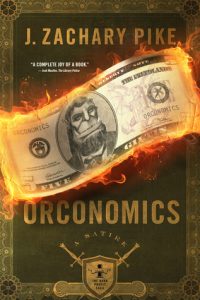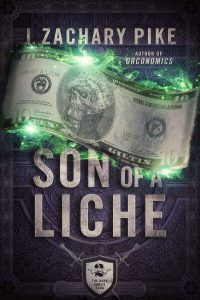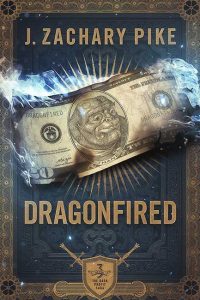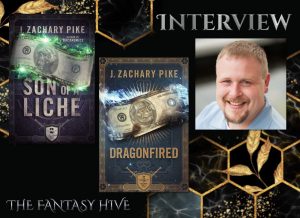INTERVIEW WITH J. ZACHARY PIKE (THE DARK PROFIT SAGA)
J. Zachary Pike was once a basement-dwelling fantasy gamer, but over time he metamorphosed into a basement-dwelling fantasy writer. By day Zack is a web professional and creative-for-hire, but at night he returns to his lair to create books, films, and illustrations that meld fantasy elements with offbeat humor. A New Englander by birth and by temperament, Zack writes strangely funny fiction on the seacoast of New Hampshire.
1. Welcome to the Hive Zack I really enjoyed my ARC of Dragonfired the last book in the Dark Profit Saga (My review is available here ) particularly for how the pantheon of Gods comes together and we finally understand the ramblings of the all-mother, the fate of the sten and the truth about Johan in a way which feels pretty seamless. How much of the ending had you already mapped out in your head when you wrote Orconomics?
The Dark Profit Saga was based on a story I’ve been drafting since I was in High School, and I knew the ending of the story since before I started the trilogy. Honestly, most of the challenge of writing Dragonfired was getting the beginning right.
 2. Which links to my next question, the eternal author question. Where would you place yourself on the plotster-to-pantster continuum and why?
2. Which links to my next question, the eternal author question. Where would you place yourself on the plotster-to-pantster continuum and why?
I envy the noble pantser, navigating the stream of consciousness like a mage drifting effortlessly through the astral plane. But I cannot translate that envy into action, and I must plot. Several months ago I tried pantsing my next novel. Last week I surrendered to my true self and purchased new outlining software.
3. I find your books, in their comic tone and contemporary resonances, remind me of Terry Pratchett and Douglas Adams. Did Adams and Pratchett play a role in inspiring you to deliver speculative comedy with a heart and a message? Which other authors have influenced your writing approach?
Absolutely. I discovered Adams first, and based on my enthusiasm for him a bookstore recommended Pratchett to me. I’d consider Discworld to be my biggest influence, and beyond that I take a lot of inspiration from games and game-related books (I love R.A. Salvatore’s Forgotten Realms books.) For nonfiction I enjoy Dave Barry and Bill Bryson.
4. You deliver some incisive commentary on our real-world issues in all three books of the Dark Profit Saga. Besides the notion of bankers and investors exploiting a market in dungeon raiding, the 2008 sub-prime crash reverberated through Son of a Liche, while Mrs Hrurk’s tale, offered echoes of Black Lives Matter. If you had to say, which was more significant for you – the sharp observations on contemporary socio-political crises or telling a great tale?
I think commentary that resonates with contemporary experiences makes a tale richer.
5. Aesop’s fables were useful tools to deliver humans lessons about life through the medium of animals. That removes the element of tribalism that tends to distort human rationality and make us susceptible to emotive messaging and misinformation. How far do you think fantastical/speculative works like Orconomics can serve that fable function – holding up a distorting mirror to society that paradoxically helps us to see ourselves clearly?
I like to think that talking about the plight of Orcish NPCs can bypass some of the defensive reflexes that might rise in the mind of a reader against an essay on economic inequality. In that way, fantasy can help shine a light on real world issues. That said, it’s important that enjoying allegorical fantasy doesn’t replace or stand-in for understanding real world issues. If speculative fiction pries open the mind a bit and prompts introspection or research, it’s done its job well.
6. Comedic fantasy is hard to get right – particularly as jokes are written without the stand-up comedian’s advantage of immediate audience reaction. How do you manage to write funny and what advice do you have for others trying to emulate your success?
I think tropes are a gold mine of comedy. When in doubt about how to make a joke, I imagine what the protagonist of a pulpy story would do, and then I try to make fun of it. It seems to be working so far. I also find it helpful to prime my mind for snark by reading humor—Pratchett, Dave Barry, Bill Bryson.
Naturally, this means the best way to emulate my success is to buy my books. (LOL Nicely done, TOM)
 7. Within the band of Gorm’s heroes that assembles, fractures and reassembles, my personal favourite is the formidable but much maligned Thane – though like him I also have a soft spot for Kaitha. Do you have a favourite character and why ? (It’s OK we won’t tell the others).
7. Within the band of Gorm’s heroes that assembles, fractures and reassembles, my personal favourite is the formidable but much maligned Thane – though like him I also have a soft spot for Kaitha. Do you have a favourite character and why ? (It’s OK we won’t tell the others).
I love Gorm, who is easy to write and as comfortable as an old glove at this point. Thane is another one dear to my heart. But I’d say my favorite character to write is Detarr Ur’Mayan; something in his aristocratic malice is incredibly fun.
8. The writing convincingly depicts the machinations of high finance and transposes them to a fantastic setting – or at least it does to my layman’s ear. What experience or research did you draw on to give that verisimilitude to the corrupt city wheelings and dealings?
I did a lot of listening / reading to news and coverage of the financial crisis after I lost my job in 2008, and found it fascinating. I think it’s sadly easy to find examples of corruption and grift in our society and economy; all it takes is paying attention to the news.
9. The internet and social media era is one in which author-reader interactions can be much faster and more direct than in the days of letters passed on by publishers. In the acknowledgements to Dragonfired you paid tribute to your patrons and newsletter fans many of whom suggested names for characters in the book. What have you enjoyed most in your involvement and engagement with the fantasy reader community?
I admit that I am a bit of a hermit by nature, often receding into my own private world when under stress. But whenever I pop online or post to patrons, there are always welcome words of encouragement and support for me. That means a lot.
10. I do rely on my kindle notes to flag up key passages or remind me of stray thoughts that occur as I read a book which may later help with drafting a review. There’s a point in Chapter 34 of Dragonfired where I just have note “I’m tearing up here!” Were there any points in the Dark Profit saga where you gave yourself an emotional reaction to your own writing?
I may have teared up at a point or two in my outline, which makes me both proud of my story and embarrassed for myself. (No need for embarrassment, I’m sure we’ve all done that – I know I have TOM)
 11. I first came to Orconomics through the annual SPFBO contest organised by Mark Lawrence. The contest has gone from strength to strength – judging by how fast it filled the 300 slots this year. How much of an impact did winning SPFBO4 make for Orconomics and, given the ever-increasing quantity of self-published books on the market, how important do you think it is to have opportunities like SPFBO that enable at least some self-published books to leap above the crowd?
11. I first came to Orconomics through the annual SPFBO contest organised by Mark Lawrence. The contest has gone from strength to strength – judging by how fast it filled the 300 slots this year. How much of an impact did winning SPFBO4 make for Orconomics and, given the ever-increasing quantity of self-published books on the market, how important do you think it is to have opportunities like SPFBO that enable at least some self-published books to leap above the crowd?
SPFBO was a huge event for me; I think the contest gave a book with a silly title some much-needed credibility. Honestly, being named a finalist was a bigger bump in sales and reviews than winning, and I discovered one of my favorite reads in recent years in that contest (Mike Shel’s Iconoclasts trilogy, which I adore.) I think self-publication is hard and getting harder, so I love to see established authors like Mark helping those of us who haven’t hit the big time find an audience.
12. All the books in the Dark Profit saga are self-published, although many authors these days take a hybrid approach. Other authors of self-published success stories have migrated towards traditional publishing. What is your view on the relative opportunities (and problems) that self-publishing offers compared to traditional publishing?
The more I learn about this business, the more I feel like an amateur at it. So with that caveat, I will say that I do not think many publishers would look at a book about Orcs and Goblins lampooning a housing crisis until it already had an audience. There is a whole side of publishing that is networking and insider knowledge and making pitches and all kinds of other work that is anathema to my basement-dwelling self. Indie publishing offers a route around those things – not an easy road, not always a lucrative one, but a route that one can take. And if it wasn’t there, I doubt anyone would have read my books.
13. You said in interview with A.C. Cobble back in 2020 that “I tend to write slow” and that, combined with the fact that the Dark Profit Saga trilogy are not short books, has contributed to a rather long gestation period for Dragonfired. With the trilogy now finished, what are you going to be working on next?
I’m working on another series set on Arth, with a character who make brief appearances in the Dark Profit Saga. I’d like to write some standalone Arth books as well.
14. And just so we don’t end on a question 13. What question should I have asked but haven’t and how would you have answered it?
You should have asked if I minded answering on question 13, and I would have answered “not really, no.”
Good answer! And once again, many thanks for joining us.
Dragonfired is due for release on the 1st September 2023 – you can pick up your copy HERE


